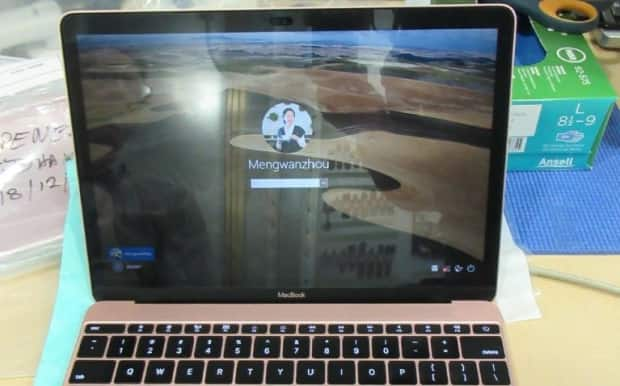RCMP exhibits-officer denies giving Meng Wanzhou's computer info to FBI
The RCMP officer who took Meng Wanzhou's phones and laptop into police custody says he didn't share technical details from the Huawei executive's electronic devices with the U.S. Federal Bureau of Investigation and doesn't recall ever saying any of his colleagues did either.
Const. Gurvinder Dhaliwal denied key elements Monday of what Meng's lawyers claim was a conspiracy between Canadian and U.S. authorities to covertly gather information that would assist the FBI in its investigation.
In B.C. Supreme Court testimony, Dhaliwal addressed an apparent contradiction between his evidence and the accounts of two of his supervisors — one of whom has denied passing along any information to the FBI, and the other of whom took notes indicating that Dhaliwal told her their colleague said he sent serial numbers to the U.S. agency.
"Did you provide this information to FBI?" asked Crown prosecutor John Gibb-Carsley.
"Did any of your RCMP colleagues tell you they provided this information to the FBI?"
Dhaliwal answered 'No' to both questions.
"Did you ever tell any of your colleagues that the information had been sent to the FBI?" Gibb-Carsley asked.
"No, I did not," Dhaliwal said.
Warrant said arrest should happen 'immediately'
Dhaliwal is one of 10 RCMP and Canada Border Services Agency officers expected to take the stand in a hearing to obtain evidence ahead of Meng's extradition proceedings next year.
The 48-year-old was arrested on a provisional extradition warrant on Dec. 1, 2018, at Vancouver's airport after arriving on a flight from Hong Kong en route to Mexico City and Argentina, where she had planned to attend a conference.

Meng faces fraud and conspiracy charges in relation to allegations that she lied to an HSBC executive about Huawei's control of a subsidiary accused of violating U.S. economic sanctions against Iran.
Proescutors claim that by relying on her alleged lies to continue a financial relationship with Huawei, HSBC placed itself at risk of loss and prosecution.
Meng's lawyers have accused Canadian authorities of violating Meng's rights at the time of her arrest by having the CBSA conduct an immigration exam, despite wording on the warrant that called for her to be arrested "immediately."
Instead, she was questioned by customs officers for almost three hours without a lawyer and without being told that she was the subject of criminal charges and an extradition warrant.
Conflicting evidence
Dhaliwal worked alongside the RCMP officer who was tasked with executing the warrant; he was put in charge of seizing Meng's electronic devices.
In that capacity, Dhaliwal was asked to photograph the laptop and phones and to record serial numbers and other technical details.

According to court documents and testimony, the FBI had made clear its interest in obtaining the information, but they would normally need to go through a mutual legal assistance treaty between agencies to get it.
Dhaliwal said he recorded the technical details and sent them to the RCMP's file co-ordinator but not to anyone else.
But notes recorded at the time, in December 2018, by one of Dhaliwal's supervisors, Sgt. Janice Vander Graaf, indicate that Dhaliwal told her the officer tasked with dealing with the FBI, Staff Sgt. Ben Chang, complied with the request.
"Gurv advised Ben Chang had email and provided serial #'s," Vander Graaf's notes say.
Vander Graaf is scheduled to testify later this week, and Chang has retained counsel and indicated that he will not testify.
Beyond denying that he or anyone else sent the technical information to the FBI, Dhaliwal said he followed procedures under the Extradition Act to ensure that the phones and laptop were treated properly as exhibits.
Not important enough to read
Dhaliwal also appeared to contradict the evidence of a CBSA officer who testified earlier that a scrap of paper containing passcodes to Meng's phones had mistakenly ended up in RCMP custody after it was left with her luggage.
Dhaliwal recalled the officer handing him the paper with the codes.
By the end of Monday, defence lawyer Scott Fenton had not yet had a chance to question Dhaliwal about the electronic devices.
Instead, he covered the events which led up to Meng's arrest, expressing incredulity when the officer admitted he had never actually taken the time to read the exact wording of the one-page warrant for Meng's arrest.
If he had, Fenton pointed out, he might have seen the word "immediately."
"You didn't think it was important for you to understand what were the terms — if any — of the provisional arrest warrant set out by the court," Fenton asked.
"It's very important, yes," Dhaliwal answered.
"But you didn't think it was important enough to read?" Fenton asked.
Dhaliwal said his partner was in charge of making the arrest, whereas he was given the job of looking after the electronic devices.
Previous witnesses for both the RCMP and the CBSA have said the decision to have the CBSA deal with Meng first was made out of respect for the border agency's jurisdiction over the airport and the need to begin a process to determine Meng's immigration admissibility.
But the defence has suggested that the customs questioning was a ruse to use the CBSA's extraordinary powers to ask Meng questions about her business in Iran. And that the delay in arresting her was in defiance of the instructions of the judge who issued the warrant.
Meng has denied the charges against her.

